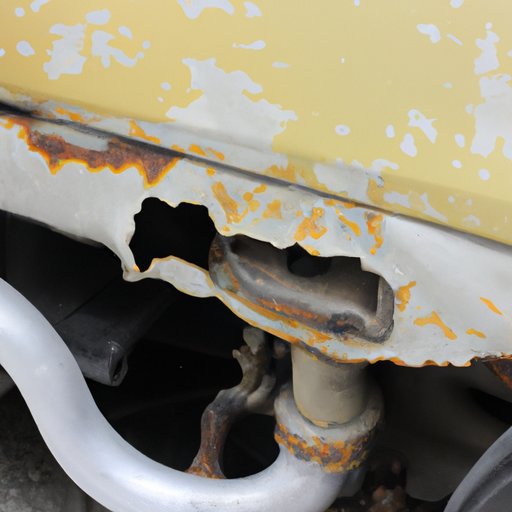
Introduction
From the kitchen sink to the garden tools, rust can show up on any metallic surface and cause a lot of damage if left untreated. But don’t panic! This article will show you how to clean rust and keep your metal surfaces shiny and rust-free.
5 Natural Remedies for Removing Rust from Metal Surfaces
If you’re looking for natural, non-toxic remedies for rust removal, you’re in the right place. Here are five DIY solutions you can try:
1. Lemon juice and salt
Mix equal parts of lemon juice and salt to form a paste. Apply the paste to the rust using a toothbrush or other small brush, and let it sit for a few hours before wiping it away with a cloth soaked in warm water.
2. Baking soda and water
Mix baking soda and water to form a paste, and apply the paste to the rusted surface. Leave it on for a few hours, then scrub and rinse the area with warm water.
3. White vinegar
Soak the rusted surface in white vinegar for a few hours or overnight. Scrub with a brush and rinse with warm water.
4. Potato and dish soap
Cut a potato in half and dip it in dish soap. Rub the surface of the rusted item with the potato until the rust is gone. Rinse with warm water and dry with a clean cloth.
5. Coca-Cola
Pour Coca-Cola over the rusted surface and let it sit for a few hours. The acid in the soda will dissolve the rust. Scrub and rinse with warm water.
The Ultimate Guide to Rust Prevention
Preventing rust is crucial to keeping your metal items in good shape. Here are some tips to help you keep rust away:
1. Keep things dry
Rust forms when metal is exposed to moisture. To prevent rust from forming in the first place, keep your metal items dry whenever possible.
2. Apply a coat of paint or oil
Another way to keep moisture away from your metal items is to apply a coat of paint or oil. This creates a barrier between the metal and the environment.
3. Store items properly
Proper storage can prevent rust from forming. Store metal items in a cool, dry place and avoid stacking them too closely together.
4. Clean items regularly
Regular cleaning can help prevent rust from forming. Wipe down metal items with a dry cloth regularly, and use a rust inhibitor spray if necessary.
From Soda to Sandpaper: The Most Effective Rust Removal Methods and When to Use Them
If you’re dealing with a serious case of rust, you might need something stronger than a natural remedy. Here are some effective rust removal methods:
1. Sandpaper
Sandpaper is a good option for removing surface rust. Use it to sand away the rust until you reach clean metal.
2. Rust converter
Rust converters are chemicals that can convert rust into a stable compound that won’t spread further. Follow the instructions on the label and apply the converter to the rusted area.
3. Rust remover
Rust removers are more aggressive than converters and can remove stubborn rust. Follow the instructions on the label and be sure to wear gloves and protect your eyes and skin.
How to Clean Rust from Old Tools: A Step-by-Step Guide
Old tools can hold sentimental value or be hard to replace. If you want to restore them to their former glory, follow these steps:
1. Identify the level of rust
Tools with light rust can be cleaned with natural remedies, but heavy rust requires stronger methods.
2. Clean the surface
Use a wire brush and a natural remedy or a chemical solution to clean the rust off the surface of the tool.
3. Soak the tool
If the rust is deep, try soaking the tool in vinegar or another rust removal solution.
4. Restore the blade
If you’re dealing with a blade, sharpen it after cleaning off the rust.
Rust Removal on a Budget: 5 Cheap and Easy Ways to Clean Rust at Home
Don’t want to spend a lot of money on rust removal? Try these budget-friendly solutions:
1. Aluminum foil
Crumple aluminum foil into a ball and rub it over the rusted area, adding water or a natural remedy to help remove the rust.
2. Baking soda and vinegar
Mix baking soda and vinegar to form a paste. Rub the paste onto the rusted area and let it sit for a few hours before scrubbing it away.
3. Salt and lime
Mix salt and lime juice to form a paste. Rub the paste onto the rusted area and let it sit for a few hours before scrubbing it away.
4. Vinegar and baking soda
Soak the rusted item in vinegar for a few hours, then sprinkle baking soda over it. Scrub the area with a brush or sponge and rinse with water.
5. Lemon juice and baking soda
Mix equal parts of lemon juice and baking soda to form a paste. Apply the paste to the rusted surface, scrub with a brush, and rinse with warm water.
Conclusion
Rust is a common problem, but it doesn’t have to be a permanent one. By using natural remedies, preventative measures, and stronger rust removal methods, you can keep your metal items looking their best.





